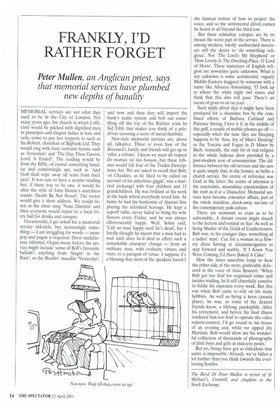FRANKLY, I'D RATHER FORGET
Peter Mullen, an Anglican priest, says
that memorial services have plumbed new depths of banality
MEMORIAL services are not what they used to be in the City of London. Not many years ago, the church in which I officiate would be packed with dignified men in pinstripes and elegant ladies in hats and veils, come to pay last respects to such as Sir Robert, chairman of Bigbank Ltd. They would sing with lusty restraint hymns such as 'Jerusalem' and 'The Day Thou Gayest, Lord, Is Ended'. The reading would be from the Bible, of course: something familiar and comfortingly apt, such as 'And God shall wipe away all tears from their eyes'. It was rare to have a secular reading but, if there was to be one, it would be after the style of John Donne's matchless sonnet 'Death Be Not Proud'. The rector would give a short address. We would listen as the choir sang 'Nunc Dimittis' and then everyone would repair to a local livery hall for drinks and canapes.
Occasionally, I get asked for a memorial service old-style, but increasingly something — I am struggling for words — more pop and pagan is required. Dress multifarious informal. Organ music before the service might include 'some of Bob's favourite ballads': anything from `Singin' in the Rain', or the Beatles' maudlin 'Yesterday'; and now and then they will import the bank's audio system and belt out something off the top of the Richter scale by Sid Filth that makes you think of a piledriver screwing a score of metal dustbins.
New-style memorial services are, above all, talkative. Three or even four of the deceased's family and friends will get up to 'offer a tribute'. I know we must all respect De mortuis nil nisi bonum, but these tributes would fall foul of the Trades Descriptions Act. We are asked to recall that Bob, 'or Chuckles, as he liked to be called on account of his infectious giggle', was a married archangel with four children and 15 grandchildren. He was brilliant at his work at the bank where everybody loved him. At home he had the bonhomie of Alastair Sim playing the reformed Scrooge. He kept a superb table, never failed to bring his wife flowers every Friday, and he was always effervescently happy. Well, Solon said, 'Call no man happy until he's dead', but I hardly thought he meant that a man had to wait until after he'd died to effect such a remarkable character change — from an ordinary man, with ordinary virtues and vices, to a paragon of virtue. I suppose it's a blessing that most of the speakers haven't the faintest notion of how to project the voice, and so the sentimental drivel cannot be heard at all beyond the third row.
But these schmaltzy eulogies are by no means the worst part of the service. There is among modem, wholly unchurched mourners still the desire to 'do something religious'. Not 'The Lord's My Shepherd' or 'How Lovely Is Thy Dwelling-Place, 0 Lord of Hosts'. These mainstays of English religion are nowadays quite unknown. What is not unknown is some sentimental, vaguely Middle-Eastern doggerel by someone with a name like Alhacca Arrnanaleg: '0 look up to where the white night owl stares and think that this also will pass/ There's an ocean of grass so sit on your.. . . '
Such sickly drivel that it might have been produced for a chocolate box by the combined efforts of Barbara Cortland and Patience Strong. I love it if, in the middle of this guff, a couple of mobile phones go off — especially when the tune they are bleeping happens to be lesu, Joy of Man's Desiring' or the Toccata and Fugue in D Minor by Bach: ironically, the only bit of real religion in the whole hideous show provided by a post-modern icon of consumerism. The difference between the old services and the new is quite simply that, in the former, as befits a church service, the centre of reference was God; in the latter, the centre of attention is the narcissistic, moonshine emotionalism of the mob as if at a Diana-fest. Memorial services have become consumer affairs, part of the whole mindless, chuck-away me-ism of the contemporary junk culture.
There are moments so crass as to be unbeatable. A distant cousin might slouch to the lectern and remind us that 'As well as being Master of the Guild of Confectioners, Bob was, in his younger days, something of a ladies' man'. Cue for a woman in a flowery dress hinting at circumnavigation to step forward and warble, 'If I Knew You Were Coming, I'd Have Baked A Cake'.
How the inner anarchist longs to hear the other side of the story, preferably delivered in the voice of Alan Bennett: 'When Bob got too frail for organised crime and insider-trading, he'd still cheerfully contrive to fiddle his expenses every week. But this was when Bob came to rely on his many hobbies. As well as being a keen canasta player, he was, as some of his dearest friends know, a lifelong paedophile. After his retirement, and before his final illness rendered him too frail to operate the video remote-control, I'd go round to his house of an evening and, while we sipped dry Martinis, Bob would show me his wonderful collection of thousands of photographs of little boys and girls in indecent poses.'
But no, things have got so ridiculous that satire is impossible. Already, we've fallen a lot further than you think towards the everlasting bonfire.
The Revd Dr Peter Mullen is rector of St Michael's, Corn hill, and chaplain to the Stock Exchange.


































































 Previous page
Previous page